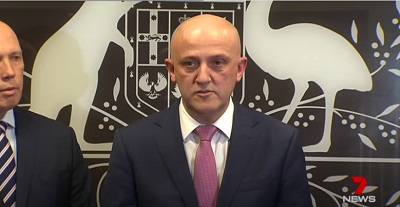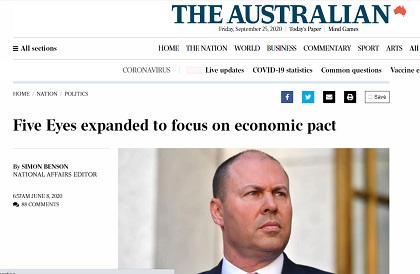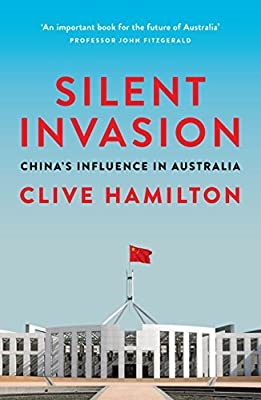Part five of a series. Previous instalments are available here: Part one; part two; part three; part four.
The freeze in Australia’s relationship with its biggest trading partner China is blamed on the assertiveness of President Xi Jinping. As the Australian Alert Service has demonstrated in this five-part China narrative series, however, the blame mostly lies on the Australian side, where the main culprit is Australia’s domestic spy agency, the Australian Security Intelligence Organisation (ASIO), and its Five Eyes spying alliance with US, UK, NZ and Canadian intelligence organisations.
ASIO claims on its website that “political independence remains central” to its activities. In ASIO’s 24 February 2020 “Annual Threat Assessment”, Director-General Mike Burgess claimed defensively that ASIO is “not a secret organisation operating as a law unto itself, conducting shadowy business around the margins of our democracy and our law. Nothing could be further from the truth.” Yet a September 2020 discussion paper by Bill Browne of the Australia Institute notes that ASIO has much less parliamentary oversight than even its Five Eyes counterparts; and there is mounting evidence ASIO is attempting to extend its control over Australia’s foreign policy, trade, economy and academia by stealth.
As reported in 2 December 2019 Australian Financial Review, ASIO’s 2018-19 annual report “perplexed some foreign affairs experts and economists” because of the expanded scope of ASIO’s interest. The report identified “foreign investment, joint ventures for foreign entities to acquire intellectual property, commercial partnerships with foreign players, relationships with university academics and technology sharing” as potential threats to Australia’s “economic prosperity and future capability”. This means that any sector where there is potential for mutually beneficial cooperation and peaceful trade with China, and other countries, is now subject to ASIO’s suspicion and influence.
Espionage laws potentially hide ASIO’s misconduct

In his 24 February “Annual Threat Assessment”, ASIO Chief Mike Burgess referred to the “robust public discussion on the threats posed to our safety and prosperity by espionage and foreign interference”, which he welcomed as a “vital part” of “strengthening the resilience” of Australia’s democracy. As revealed in part four of this series, “ASIO’s disinformation campaign” (AAS, 16 Sept. 2020), there is evidence ASIO directing this “robust public discussion” as the source of the extensive media disinformation that has whipped up hysteria about alleged Chinese foreign interference in Australia. Although the Turnbull government ostensibly introduced its controversial 2018 espionage and foreign interference laws in response to sensationalist media reporting and the findings of the still-classified 2017 Garnaut-ASIO report, a 10 December 2018 media release from Attorney General Christian Porter revealed the legislation was actually “requested by our national security agencies”, i.e. ASIO.
The contentious espionage and foreign interference legislation which the national security agencies requested inhibits the intelligence watchdog’s monitoring of potential misconduct by these same agencies. The 31 January 2018 Sydney Morning Herald revealed that the Inspector-General of Intelligence and Security (IGIS) had “raised fears that because of the way the legislation has been drafted, spies might have doubts about whether they can safely talk to the watchdog without falling foul of laws that prevent their divulging secrets to outsiders”. Whistleblowers breaking secrecy provisions to report ASIO’s misconduct to the IGIS face 20 years’ jail if they can’t satisfy the legislation’s reverse burden of proof provisions. The Attorney-General’s office dismissed the IGIS’s concerns, saying it was “satisfied” none of these issues would be a problem.
Pretext for more powers
The 2018 espionage and foreign interference legislation established the Foreign Influence Transparency Scheme (FITS), run out of the Attorney-General’s office. Despite claims that legislating the FITS was urgent to protect Australia’s democracy, its 2018-19 first annual report revealed FITS had not once used its powers to issue formal transparency notices to potential foreign influence operations. Instead of concluding, reasonably, that the claims of foreign interference may have been exaggerated, the government handed management of FITS to the people who would find it, whether it was there or not.
The 2 March 2020 Herald Sun reported that Attorney-General Christian Porter had replaced the entire FITS leadership team, assembling a “crack team of experts … to unmask secret agents covertly pushing foreign interests on our soil”, with John Garnaut hired to “prepare evidentiary briefs against people suspected of being undeclared agents of influence.” The co-author of the 2017 Garnaut-ASIO espionage report, Garnaut was a former Fairfax foreign correspondent in China, who became the advisor to Prime Minister Malcolm Turnbull who influenced his hostile turn against China and his foreign interference laws. Yet when a federal judge in 2019 tested the credibility of Garnaut’s China claims in a defamation suit brought by Chinese-Australian businessman Dr Chau Chak Wing (for claims later repeated by Andrew Hastie, see below), the judge declared he had “serious doubts about the honesty and reliability” of Garnaut’s evidence.
What followed Garnaut’s appointment to the FITS was a rapid-fire series of apparently coordinated events, which justified further foreign influence legislation.
As reported in the 26 August 2020 AAS, on 6 August 2020 Minister Peter Dutton’s Home Affairs Department released a discussion white paper, Protecting Critical Infrastructure and Systems of National Significance, which foreshadowed the expansion of Home Affairs’ definition of “critical infrastructure” to encompass a number of industries, including universities, providing a pretext for the ASIO to interfere in these organisations for “national security”.

On 20 August, hawkish anti-China think tank the Australian Strategic Policy Institute (ASPI), for which Garnaut is a consultant, published a report by Alex Joske titled Hunting the Phoenix, which alleged the Chinese Communist Party government uses talent recruitment programs to gain clandestine access to technology, specifically naming China’s Thousand Talents Plan. (22-year-old Joske was the researcher for Clive Hamilton’s 2018 book Silent Invasion, which alleged widespread Chinese infiltration of Australia.)
Four days later, The Australian ran a sensationalist exposé claiming: “Australian academics are giving China access to their inventions amid concerns they could be used for military or intelligence purposes.” The article, which quoted Joske and published intimidating mug shot-like photographs of 30 of the accused researchers, quoted China-agitator FBI Director Christopher Wray’s description of the Thousand Talents program as “economic espionage”.
That same day, China-hawk MP Andrew Hastie, who chairs the Parliamentary committee that provides what little oversight ASIO does receive, personally wrote to Home Affairs Minister Peter Dutton expressing concerns about foreign interference in Australia’s universities. Hastie told the 28 August 2020 Guardian that China’s Thousand Talents Plan may be “designed to harvest research and talent and intellectual property from other countries for the benefit of the Chinese government”, saying his Parliamentary Joint Committee on Intelligence and Security (PJCIS) was willing to conduct an inquiry into the matter. Despite the fact that international research at Australia’s universities is already subject to at least seven different pieces of Commonwealth law, Hastie got his wish. On 31 August Dutton formally wrote to Hastie requesting the PJCIS inquire into potential foreign interference in Australian universities.
Despite Joske’s and Hastie’s dire warnings about the Thousand Talents program, in a 14 September interview with Business Now Asia Pacific, James Laurenceson, Director of the Australia-China Relations Institute at University of Technology Sydney, said the program was “entirely unremarkable”, noting countries all around the world, including Australia, have recruitment programs to attract academic talent. Laurensecon addressed media reporting over intellectual property and technology transfer concerns, noting money-conscious universities would protect their own interests if they thought particular patents had promising commercial application.
While Australian media were hysterically alleging Chinese interference in universities and research through the Thousand Talents program, the 27 August Sydney Morning Herald reported the Attorney General’s office [finally] used its powers under the FITS to “[demand] a Confucius Institute at an Australian university explain why it shouldn’t be on a federal foreign influence register … “ SMH reported this was the first action of its kind against a university body, of only three total instances of transparency notices exercised under the FITS since the scheme’s 2018 implementation. Evidently, ASIO-collaborator John Garnaut has made use of his new role with the FITS.
The attack against Confucius Institutes, which teach Chinese language and cultural programs in universities globally, was foreshadowed by John Garnaut’s 2018 testimony before US Senators, where he claimed the institutes were connected to CCP propaganda and foreign influence. Australian academic Clive Hamilton’s China-hawk propaganda book, Silent Invasion (2018), referred to Confucius Institutes as “Academic Malware”.
All this well-coordinated hype provided justification for new foreign interference legislation. On 3 September the government introduced the Australia’s Foreign Relations (State and Territory Arrangements) Bill 2020, a bill purportedly intended to promote transparency through federal oversight of state arrangements with foreign governments and “associated entities”, yet which actually introduces sweeping powers for federal veto of state and local government trade, academic, and cultural exchange programs with other countries.
Writing for the 7 September 2020 Conversation, Melissa Conley Tyler, a Research Fellow for the Asia Institute at the University of Melbourne, said the Bill should not pass Parliament, as “Not only has the government failed to identify any specific problem with the status quo, the bill rests on a fundamental misunderstanding of the nature of modern diplomacy.” She said the government had “failed to pinpoint a real problem”, noting “Australia already has the ability to protect itself, with existing laws on espionage, foreign interference and foreign investment and a University Foreign Interference Taskforce.” The bill “badly overreaches”, Conley Tyler said. “We made it through the Cold War without needing this type of legislation. …if, as many believe, the bill is directed at China, the irony is that fighting the Chinese Community Party seems to bring out the Australian government’s authoritarian tendencies.”
Conley declared the legislation “badly overreaches by seeking to regulate activities across education, culture, research and trade. For example, it treats a visual artist exchange between Victoria and Jiangsu or a library agreement between the City of Sydney and Guangzhou as issues of foreign policy. … the legislation sends exactly the wrong message to the wider community: to be uneasy about international engagement.”
In his 14th September interview with Business Now Asia Pacific, James Laurensecon expressed concerns the proposed Bill could be used by media or the government itself in “some kind of McCarthyist witch hunt”, discouraging academic talent from working with Australian universities: “Say you’re a top Chinese-Australian scientist at a leading Australian university, why would you cop that sort of vilification? You’re going to go elsewhere”.
ASIO’s many talents: advising foreign investment and economic policy
ASIO’s “scope creep” has expanded to foreign investment. ASIO’s 2013-14 Annual Report, written under Director David Irvine in his last year at the agency, did not mention the words “foreign investment” or the Foreign Investment Review Board (FIRB).
In 2015, Irvine was assigned to FIRB, and two years later was unexpectedly appointed chair of the organisation, despite having no background in economics or business. As reported in 21 October 2019 Australian Financial Review, in the years between Irvine’s move from ASIO to FIRB, there has been a 12 percent annual rise in FIRB reviews by ASIO, which conducted 275 foreign investment assessments the previous year, providing advice to the FIRB.

ASIO’s scope is broadening from advising foreign investment boards, to influencing Australia’s entire economy. As reported by the Citizens Party, (24 June 2020 AAS), the Australian government is moving to allow security agencies to determine economic policy, with Prime Minister Scott Morrison announcing in June 2020 that Australia was working to take the Five Eyes spying alliance “into the commercial sphere” in order to “build trusted supply chains”.
In June 2020, Treasurer Josh Frydenberg announced major reforms to Australia’s foreign investment framework, introducing a national security test for foreign investors, and increased powers for the Treasurer to control foreign investment on national security grounds.
ASIO’s shadow foreign policy agenda
ASIO’s “scope creep” has also expanded to foreign investment and other areas of economic policy, which is allowing the Five Eyes apparatus to shape Australia’s economic relationships with other countries.
In ASIO’s 24 February 2020 “Annual Threat Assessment”, Director-General Burgess declared parliamentarians were a potential target for foreign interference, echoing an ongoing media narrative supported by anonymous leaks from ASIO itself (see “ASIO’s disinformation campaign”, AAS 17 Sept.). Contradicting Burgess’s professed concerns, however, there is mounting evidence that ASIO uses proxies to influence politicians and run a shadow foreign policy agenda, completely at odds with its claim of “political independence”.
On 22 May 2018, Andrew Hastie triggered diplomatic shockwaves when he used parliamentary privilege to accuse prominent Chinese-Australian businessman Dr Chau Chak Wing of involvement in a bribery conspiracy, claims later discredited by a federal court. As reported by ABC on 24 May 2018, Hastie is a former member of the SAS’s 4 Squadron, an elite military intelligence unit. Hastie’s decision to forewarn then-ASIO chief Duncan Lewis about his intended speech, rather than his own prime minister, alarmed former diplomat and public service chief John Menadue. In a 3 January 2019 Pearls and Irritations article titled “Our intelligence agencies are out of control” Menadue warned: “The Chair of the parliamentary committee supposedly supervising ASIO (Hastie) and the head of ASIO (Lewis) are old SAS colleagues. Hastie has become a mouthpiece for ASIO rather than its supervisor. It is extraordinary and dangerous.”
Hastie’s inflammatory speech with its resulting media frenzy was curiously timed, derailing Australian government attempts to repair the Australia-China relationship. Only hours prior, Foreign Minister Julie Bishop had met with her Chinese counterpart, Wang Yi, intending to smooth over diplomatic ties with China, which were strained in the wake of the foreign influence and espionage legislation Hastie himself championed.
This diplomatic sabotage wasn’t a one-off. In January 2019, Defence Minister Christopher Pyne was in China attempting to repair strained bilateral ties, the first Australian defence minister to visit China in four years. The 28 January AFR reported Pyne’s efforts to carve out a diplomatic line for Australia in regards to the US-China relationship and the contentious South China Sea; Pyne said: “In an age of increasing interdependence, a ‘might is right’ approach serves the long-term interests of no country.” Was it a coincidence, then, that as Pyne was on his mission, a Chinese-Australian closely linked to John Garnaut and ASIO, Yang Hengjun, also visited China, where his longstanding intelligence connections likely led to his highly publicised arrest and the subsequent formal charges of espionage by Chinese authorities? The ensuing Australian media uproar strained Pyne’s diplomatic efforts to repair the China-Australia relationship.
This question must be asked because a similar incident had happened to Yang previously. In 2011, right before Prime Minister Julia Gillard’s first trip to China, Yang was sensationally reported missing in China, assumed detained by China’s security police, by then-Fairfax journalist and his long-time friend, John Garnaut. Yang reappeared 48 hours later claiming his disappearance was a “misunderstanding”, but it was enough to create a diplomatic problem for Gillard. Internal emails of the private intelligence agency Stratfor, which were obtained by WikiLeaks, reveal Stratfor’s analysts thought the timing of Yang’s alleged arrest by Chinese authorities was “odd”, given the detrimental impact on Gillard’s diplomatic visit.
Another case shows a definite pattern. Chinese-Australian Professor Feng Chongyi, also associated with John Garnaut and ASIO (see part 3 of this series, “Espionage and interference”, AAS, 9 Sept.), travelled to China in March 2017, where he was detained and questioned over his connections to foreign intelligence. Feng’s trip, and the ensuing Australian media uproar over his detention, coincided with Chinese Premier Li Keqiang’s five day visit to Australia, intended to ratify an extradition treaty which had been in the works for a decade. Li was pushing for closer trade ties, and cautioned Australia against picking sides between the USA and China, which he said could result in a return to “Cold War” mentality. ASIO-linked Feng’s detention derailed the treaty.

The China narrative
This “China narrative” series has examined the influencers behind Australian academic Clive Hamilton’s crusade against alleged Chinese “interference”. As this author explored the background behind the China narrative, it became evident that themes prevalent in Hamilton’s McCarthyite books, Silent Invasion and Hidden Hand, are revealing in their reflection of ASIO’s disinformation campaign—particularly targeting and disparaging any area where friendly relations or cooperation with China could be extended.
ASIO claims “political independence”, yet is expanding its influence over Australia’s economy, foreign policy and academia, justified by media hysteria over Chinese “foreign interference” from a disinformation campaign directed by ASIO itself. ASIO’s unprecedented “scope creep” means Australia’s future is determined by the agenda of a largely unaccountable intelligence agency, which is under instruction from the Anglo-American Five Eyes apparatus—the real foreign interference in Australian politics. Unravelling the China narrative makes it abundantly clear: behind the “China threat” smokescreen, all roads lead to ASIO.
By Melissa Harrison, Australian Alert Service, 23 September 2020






